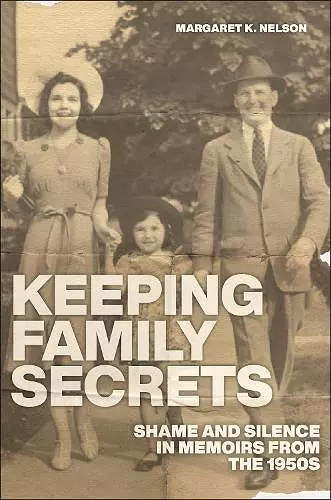Keeping Family Secrets
Shame and Silence in Memoirs from the 1950s
Format:Hardback
Publisher:New York University Press
Published:8th Nov '22
Should be back in stock very soon

From teen pregnancy and gay sexuality to Communism and disability, the startling secrets that families kept during the Cold War era
All families have secrets but the facts requiring secrecy change with time. Nowadays A lesbian partnership, a "bastard" son, an aunt who is a prostitute, or a criminal grandfather might be of little or no consequence but could have unraveled a family at an earlier moment in history. Margaret K. Nelson is interested in how families keep secrets from each other and from outsiders when to do otherwise would risk eliciting not only embarrassment or discomfort, but profound shame and, in some cases, danger. Drawing on over 150 memoirs describing childhoods in the period between the aftermath of World War II and the 1960s, Nelson highlights the importance of history in creating family secrets and demonstrates the use of personal stories to understand how people make sense of themselves and their social worlds.
Keeping Family Secrets uncovers hidden stories of same-sex attraction among boys, unwed pregnancies among teenage girls, the institutionalization of children with mental and physical disabilities, participation in left-wing political activities, adoption, and Jewish ancestry. The members of ordinary families kept these issues secret to hide the disconnect between the reality of their own family and the prevailing ideals of what a family should be. Personal accounts reveal the costs associated with keeping family secrets, as family members lie, hurl epithets, inflict abuse, and even deny family membership to protect themselves from the shame and danger of public knowledge. Keeping Family Secrets sheds light not only on decades-old secrets but pushes us to confront what secrets our families keep today.
"Keeping Family Secrets: Shame and Silence in Memoirs from the 1950s offers foundational connections for the lay and early sociological audience, yet also contains thoughtful fodder for more senior sociologists. I enthusiastically invite scholars to assign, share, and build upon her beautifully written and widely useful book." (Social Forces) "This is deep stuff. What this book reveals is fascinating." - Jean Roberta (Gay & Lesbian Review) "At a time when the sanctity of the family unit was prized above all else, the hollowing of these connections through collusion and lies is a stark consequence of the pressure of keeping up appearances [in the 1950's]. An excellent addition to any memoir or history collection." (Library Journal) "This is an outstanding book. Nelson is a terrific writer, she highlights the difficult and painful processes entailed in keeping different kinds of family secrets....this book will make a big splash." (Jennifer L. Pierce, co-author of Telling Stories: The Use of Personal Narratives in the Social Sciences and History) "This highly original book uses memoirs as a window into the ways that families are both constructed and disassembled. Nelson traffics in contradictions, which makes her analysis all the more complex and interesting." (Karen V. Hansen, author of Encounter on the Great Plains: Scandinavian Settlers and the Dispossession of Dakota Indians, 1890-1930) "Margaret Nelson's innovative book analyzes memoirs from the 1950s and 60s to tell the compelling stories of outsiders--institutionalized children's siblings, same-sex boys, unmarried pregnant girls, hidden ancestors or genetic connections, and red diaper babies. Nelson exposes the varied responses to these secrets as families conceal them either from outsiders or their own members. Some responses bond families together while expelling outsiders but others threaten family ties. A thought-provoking book." (Naomi Gerstel, co-author of Unequal Time: Gender, Class, and Family in Employment Schedules) "Nelson has written a penetrating and insightful account….Whatever the complicated reasons people have for creating secrets, their consequences unfold unpredictably and unevenly across the history of a family and the society at large. Just as family secrets generate both inclusion and exclusion - who knows, who doesn't, and where the lines are drawn - they also reflect the inequities of the wider society. It wasn't just tormented individuals, but a tormented 1950s society itself, that so often commanded, "We will never speak of this again."" (Philip N. Cohen, author of The Family: Diversity, Inequality, and Social Change)
ISBN: 9781479815623
Dimensions: unknown
Weight: 472g
256 pages